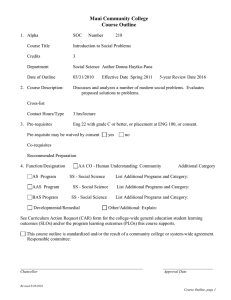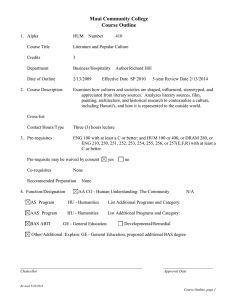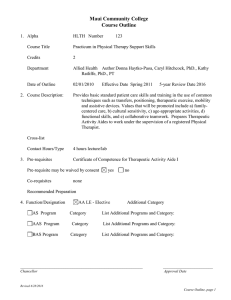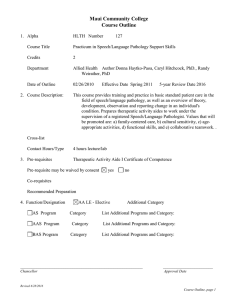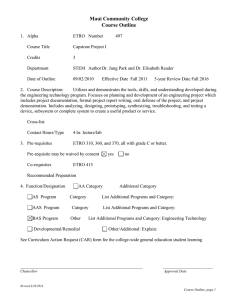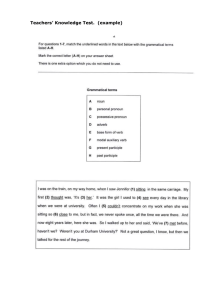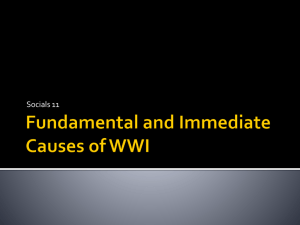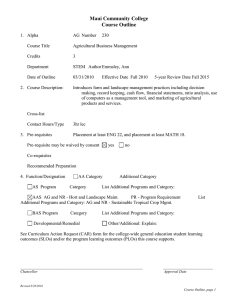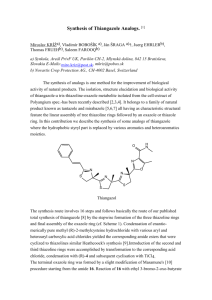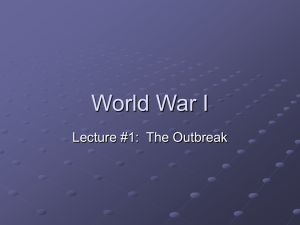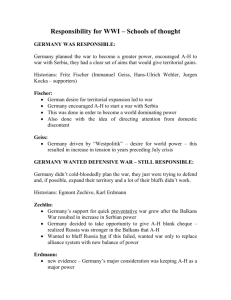2008.65 - English (ENG) 210: Research Writing, Course Outline
advertisement
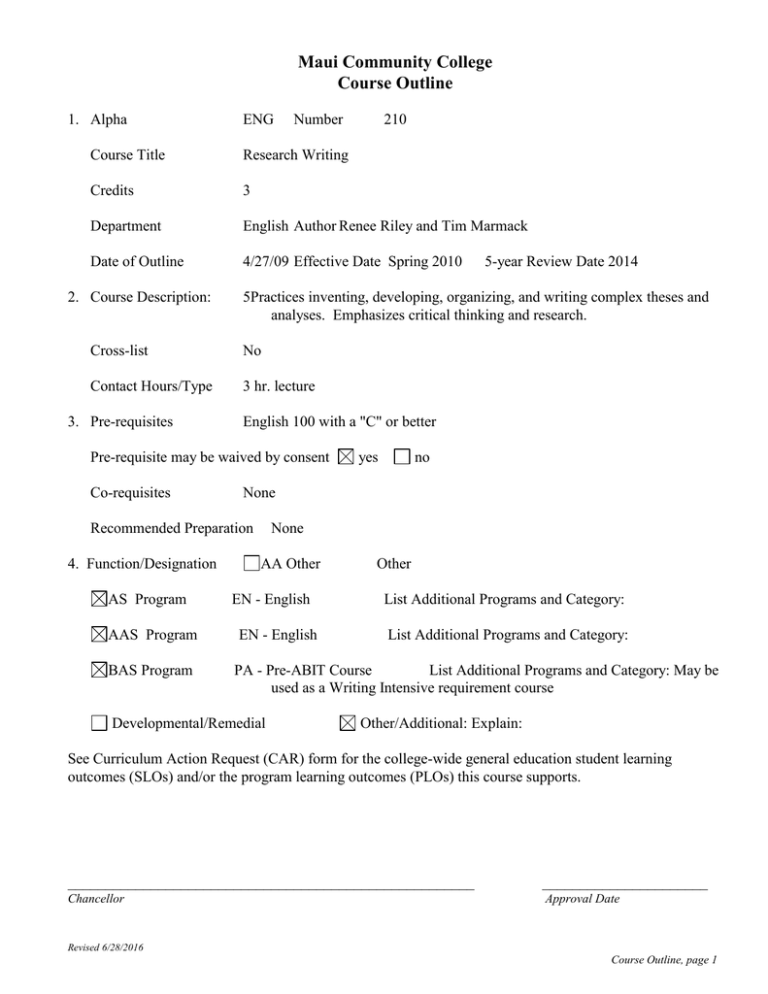
Maui Community College Course Outline 1. Alpha ENG Number 210 Course Title Research Writing Credits 3 Department English Author Renee Riley and Tim Marmack Date of Outline 4/27/09 Effective Date Spring 2010 2. Course Description: 5Practices inventing, developing, organizing, and writing complex theses and analyses. Emphasizes critical thinking and research. Cross-list No Contact Hours/Type 3 hr. lecture 3. Pre-requisites English 100 with a "C" or better Pre-requisite may be waived by consent Co-requisites AS Program AAS Program BAS Program yes no None Recommended Preparation 4. Function/Designation 5-year Review Date 2014 None AA Other EN - English EN - English Other List Additional Programs and Category: List Additional Programs and Category: PA - Pre-ABIT Course List Additional Programs and Category: May be used as a Writing Intensive requirement course Developmental/Remedial Other/Additional: Explain: See Curriculum Action Request (CAR) form for the college-wide general education student learning outcomes (SLOs) and/or the program learning outcomes (PLOs) this course supports. ______________________________________________________ ______________________ Chancellor Approval Date Revised 6/28/2016 Course Outline, page 1 2 This course outline is standardized and/or the result of a community college or system-wide agreement. Responsible committee: 5. Student Learning Outcomes (SLOs): List one to four inclusive SLOs. For assessment, link these to #7 Recommended Course Content, and #9 Recommended Course Requirements & Evaluation. Use roman numerals (I., II., III.) to designate SLOs On successful completion of this course, students will be able to: I. Analyze and synthesize print and electronic information for a variety of research writing objectives. II. Demonstrate a clear voice and understanding of audience in writing sustained discourse. III. IV. 6. Competencies/Concepts/Issues/Skills For assessment, link these to #7 Recommended Course Content, and #9 Recommended Course Requirements & Evaluation. Use lower case letters (a., b.…zz. )to designate competencies/skills/issues On successful completion of this course, students will be able to: On successful completion of English 210, students will demonstrate the following skills: a. Write well-reasoned compositions that reveal the complexity of the topics they have chosen to explore or argue b. Read for main points, perspective, and purpose; evaluate the quality of evidence, negotiate conflicting positions, and analyze the effectiveness of a text’s approach, in order to integrate that knowledge into their writing c. Choose language, style, and organization appropriate to particular purposes and audiences d. Synthesize previous experience and knowledge with the ideas and information they encounter as they read and discover as they write e. Use sources such as libraries and the Internet to enhance their understanding of the ideas they explore or argue in their writing; analyze and evaluate their research for reliability, bias, and relevance f. Use readers’ responses as one source for revising writing g. Use standard disciplinary conventions to integrate and document sources in either MLA or APA formats h. Edit and proofread in all stages of the writing process, especially when writing for public audiences. Control such surface features as syntax, grammar, punctuation, and spelling 7. Suggested Course Content and Approximate Time Spent on Each Topic Linked to #5. Student Learning Outcomes and # 6 Competencies/Skills/Issues 14-16 weeks - Analyze and discuss “facts.” (I, II, a-h) 14-16 weeks - Analyze and discuss challenges of critical thinking and assumptions. (I, II, a-h) 14-16 weeks - Demonstrate inductive reasoning and inductive fallacies (reasoning from evidence). (I, II, a-h) 14-16 weeks - Demonstrate deductive reasoning - reasoning for premises, and deductive fallacies. (I, II, a-h) 14-16 weeks - Link observation, facts, and inferences. (I, II, a-h) Revised 6/28/2016 course outline 3 14-16 weeks - Assess viewpoints and sources. (I, II, a-h) 10 -16 weeks - Analyze and create arguments; build structure, support, work with controversy. (I, II, a-h) 2-16 weeks - Experience a group collaborative project. (I, II, a-h) 8. Text and Materials, Reference Materials, and Auxiliary Materials Appropriate text(s) and materials will be chosen at the time the course is offered from those currently available in the field. Examples include: Barnet, Sylvan and Hugo Bedau. Current Issues and Enduring Questions: A Guide to Critical Thinking and Argument, with Readings. 8th ed. Boston: Bedford/St. Martin’s: 2008. Appropriate reference materials will be chosen at the time the course is offered from those currently available in the field. Examples include: Hacker, Diana. A Writer's Reference. 6th ed. Boston: Bedford/St. Martin's: 2008. Appropriate auxiliary materials will be chosen at the time the course is offered from those currently available in the field. Examples include: Handouts and web-based links provided by the instructor. 9. Suggested Course Requirements and Evaluation Linked to #5. Student Learning Outcomes (SLOs) and #6 Competencies/Skills/Issues Specific course requirements are at the discretion of the instructor at the time the course is being offered. Suggested requirements might include, but are not limited to: Attendance, Participation, and/or informal writings Discussion Board postings Major Research Papers Midterm Final Examination Total 10% 20% 40% 15% 15% 100% (I, II, a-h) (I, II, a-h) (I, II, a-h) (I, II, a-h) (I, II, a-h) (I, II, a-h) 10. Methods of Instruction Instructional methods will vary considerably by instructor. Specific methods are at the discretion of the instructor teaching the course and might include, but are not limited to: a. Small group activities b. Class lectures c. Problem-solving methods d. In-class exercises e. Class discussion f. Audio, visual, and Internet presentations g. Individual and group class presentations h. Student-teacher conferencing Revised 6/28/2016 course outline 4 k. Guest speakers l. Homework assignments such as: - formal and informal writing - responding in writing to readings - reading materials 11. Assessment of Intended Student Learning Outcomes Standards Grid attached 12. Additional Information: Revised 6/28/2016 course outline
